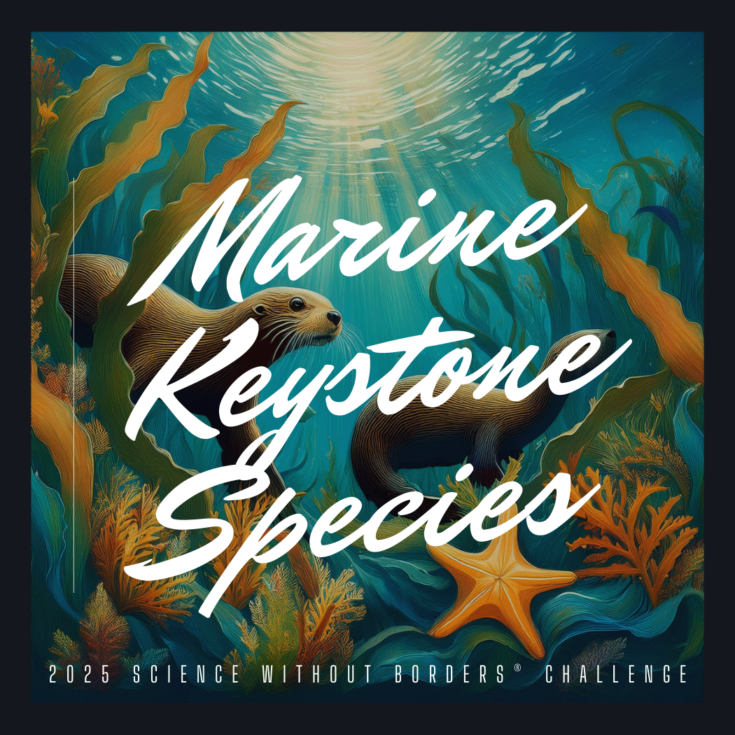This Year’s Theme: Marine Keystone Species
The 2025 Science Without Borders® Challenge is now open, inviting young artists from around the globe to participate. This year’s theme, “Marine Keystone Species,” highlights plants and animals whose existence is essential to the health and balance of marine ecosystems.
Why Focus on Marine Keystone Species?
A keystone species plays a critical role in its ecosystem, much like the keystone in an arch. The ecosystem could collapse without these species, much like an arch would crumble without its keystone. These species aren’t necessarily the most abundant or the largest, but their impact is profound. In the ocean, they might be a coral, a predatory fish, or even a specific type of algae, each playing a unique and irreplaceable role in their habitat.
What is the Science Without Borders® Challenge?
The Science Without Borders® Challenge is an international art competition designed to engage students and promote ocean conservation. Open to young artists between the ages of 11 and 19, the challenge encourages participants to create artwork highlighting important themes related to marine science and conservation. Each year, the competition focuses on a specific theme, such as threats to coral reefs, overfishing, or endangered species, to raise awareness about the importance of protecting the world’s ocean. The challenge aims to inspire creativity and foster a deeper understanding of marine environments while providing students with an opportunity to have their work recognized globally. Winners receive scholarships, and their artwork is showcased to help spread the message of ocean conservation.
What Should Your Artwork Include?
Participants are encouraged to select a marine keystone species from various ocean ecosystems, including kelp forests, intertidal zones, seagrass meadows, and the polar regions, among others. Their artwork should depict the species in its natural habitat, highlighting its role in maintaining the ecosystem’s health and stability.
The goal is to show the importance of these species in their habitat. How does your chosen species impact other creatures in its ecosystem? What happens if this species is removed? These are the questions the participant’s artwork should seek to answer, visually engaging the viewer in the complex and delicate balance of marine life.
We encourage participants to explore this topic more by exploring and learning about the theme.
Why Participate?
By participating in the Science Without Borders® Challenge, you can be part of a global movement advocating for ocean conservation. Your art can inspire others to learn more about marine ecosystems and the vital roles played by keystone species. Plus, winners will receive scholarships up to $500, and their artwork will be showcased internationally, bringing attention to the importance of marine conservation.
How to Enter
To enter the 2025 Science Without Borders® Challenge, follow the Contest Rules, review the Tips for Success, and upload your artwork to our online Submission Form. The Challenge is open to all students who are 11-19 years old and enrolled in primary or secondary school (or the home-school equivalent). The contest is free to enter and students can win up to $500 for artwork that best reflects this year’s theme. Entries must be received by Monday, March 3, 2025, to be eligible to win.
Each participant is required to have a teacher sponsor, who will help guide them through the submission process and ensure that all entry requirements are met. When submitting their entry, students must provide their sponsor’s contact information, including name, phone number, and email address.
Help us get the word out about this competition by telling any young artists and teachers you know and encouraging them to apply. Sign up for our newsletter below and follow us on Facebook, Twitter, and Instagram for contest announcements.
Get started today and help us ensure that the keystone species of our oceans continue to hold their ecosystems together!

One Comment on “Announcing our 13th Annual Science Without Borders® Challenge Art Contest! This year’s theme is Marine Keystone Species.”
Gemma ML Iso
ATTN: Amy Heemsoth
Hello Amy! We have corresponded before regarding this art competition. I just couldnt find the old email I sent you but in that email I was asking for your group’s permission that we facilitate an info drive here in my place (Negros Oriental, Philippines) so that we can send entries to the competition. This time, I want to facilitate a pre-contest of our own here (though my Culture and Arts organization and with the collaboration of our Dept. of Education-NegOr), my group will take charge of the actual competition and the prizes of the winners. Whoever wins in our elimination round, their artworks will be sent to the Khaled bin Sultan Living Oceans Foundation’s art competition. At least, this way, our entries will have bigger chances of being chosen. Is this idea worth exploring for your group? I’ll wait for your response.